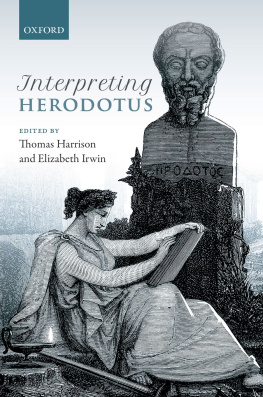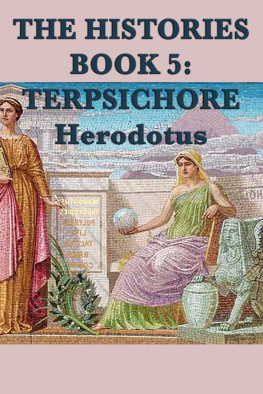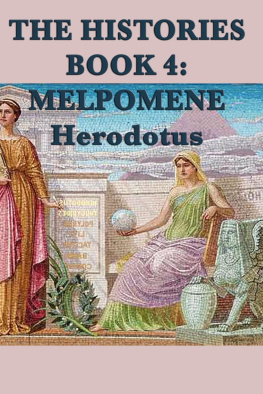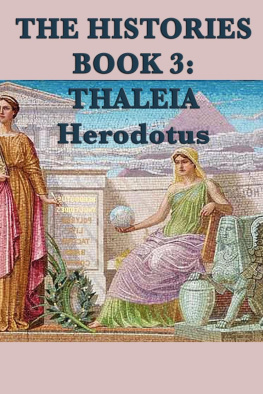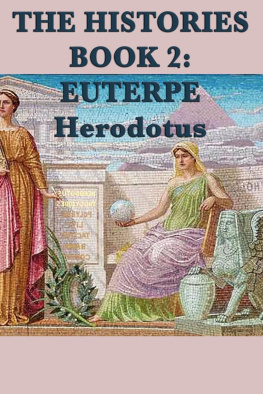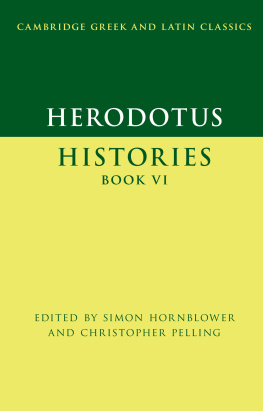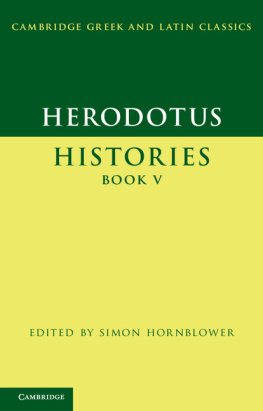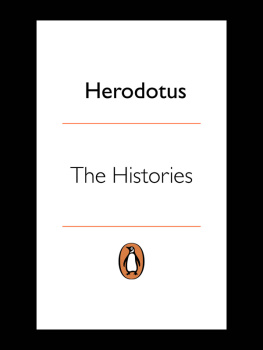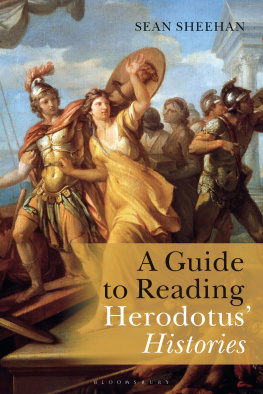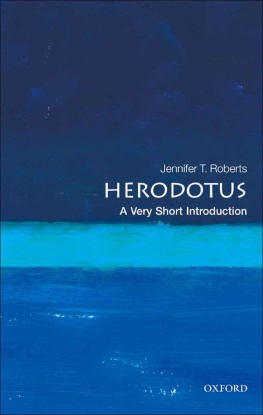Interpreting Herodotus

Great Clarendon Street, Oxford, OX2 6DP, United Kingdom
Oxford University Press is a department of the University of Oxford. It furthers the University's objective of excellence in research, scholarship, and education by publishing worldwide. Oxford is a registered trade mark of Oxford University Press in the UK and in certain other countries
Thomas Harrison, Elizabeth Irwin, and Oxford University Press 2018
The moral rights of the authors have been asserted
First Edition published in 2018
Impression: 1
All rights reserved. No part of this publication may be reproduced, stored in a retrieval system, or transmitted, in any form or by any means, without the prior permission in writing of Oxford University Press, or as expressly permitted by law, by licence or under terms agreed with the appropriate reprographics rights organization. Enquiries concerning reproduction outside the scope of the above should be sent to the Rights Department, Oxford University Press, at the address above
You must not circulate this work in any other form and you must impose this same condition on any acquirer
Published in the United States of America by Oxford University Press 198 Madison Avenue, New York, NY 10016, United States of America
British Library Cataloguing in Publication Data
Data available
Library of Congress Control Number: 2017954188
ISBN 9780198803614
ebook ISBN 9780192525536
Printed and bound by CPI Group (UK) Ltd, Croydon, CR0 4YY
Links to third party websites are provided by Oxford in good faith and for information only. Oxford disclaims any responsibility for the materials contained in any third party website referenced in this work.
Acknowledgements
This volume originated in a conference, The Past in the Present: Interpreting Herodotus after Charles W. Fornara, held at Columbia University in September 2013. For support during the original conference, and in the conversion of papers to print, we are indebted to a number of individuals and institutions. For financial support, we are grateful to (at Columbia) the Stanwood Cockey Lodge Fund of the Department of Classics, the University Seminar in Classical Civilization, the Center for the Ancient Mediterranean, and (at Liverpool) the John Percival Postgate Trust. For practical support and guidance, we thank William Harris, Gerry Visco, Selina Rivera, Joseph Keckler, Francesco De Angelis, Evan Jewell, Simone Oppen, Anna Conser, and especially Matthias Hanses and Max Leventhal. For their professionalism in seeing the book through production, we are grateful to Charlotte Loveridge, Georgina Leighton, Tom Perridge, Tim Beck, and Gayathri Manoharan for OUP.
Finally, we should like to record our thanks to all those who were present at the original conference but whose contributions to the volume may not be immediately apparent. Above all, thanks are due to Charles Fornara himselfgraciously forbearing throughout, even as his Essay was picked apart as well as acclaimedand to our two invited respondents, John Marincola and John Moles. John Moles declined an invitation to speak at the conference on the basis that he had nothing to say. The reality, as we had safely predicted, was otherwise. References to Moles litter this volume perhaps more than any other works, bar Fornaras Essay itself; though Herodotus was just one author of very many on which John published, his work on the Histories is fundamental to the themes of this volume. Together with all the contributors to this volume, we join in recording our debt to John as a model of humane scholarship, and in mourning his untimely death.
Contents
All dates are bc unless specified. The titles of all scholarly journals in the Bibliography are given in full. References in the form 3.802 or 7.8.1 that do not specify an author are to Herodotus Histories. Abbreviations of Greek and Latin authors follow Liddell and Scotts Lexicon or the Oxford Latin Dictionary respectively, with the following exceptions:
| Aesch. | Aeschylus |
| [Arist.] Ath. Pol. | [Aristotle] Athenaion Politeia |
| Dem. | Demosthenes |
| Diod. Sic. | Diodorus Siculus |
| Eur. | Euripides |
| Plut. | Plutarch |
| Soph. | Sophocles |
| Strab. | Strabo |
| Thuc. | Thucydides |
| Xen. | Xenophon |
Other abbreviations used are as follows:
| ADD | C. H. W. Johns (ed.) Assyrian Deeds and Documents (Cambridge, 18981923) |
| AHw | W. von Soden (ed.) Akkadisches Handwrterbuch (Wiesbaden, 196581) |
| ARM | Archives royales de Mari (Paris, Leuven, 1950) |
| ARV | J. D. Beazley, Attic Red-Figure Vase-Painters, 3 vols (Oxford, 1942; 2nd edn, 1963) |
| Asheri III | Erodoto. Le Storie. Libro III: La Persia (Milan, 1990) |
| Asheri and Corcella VIII | D. Asheri and A. Corcella, Erodoto. Le storie. Libro VIII: La vittoria di Temistocle (Milan, 2003) |
| Asheri and Corcella IX | D. Asheri and A. Corcella, Erodoto. Le storie. Libro IX: La battaglia di Platea (Milan, 2006) |
| Asheri, Lloyd, and Corcella | D. Asheri, A. B. Lloyd, and A. Corcella, A Commentary on Herodotus Books IIV (ed. O. Murray and A. Moreno) (Oxford, 2007) |
| ATL | B. D. Meritt, H. T. Wade-Gery, and M. F. McGregor, The Athenian Tribute Lists, 4 vols (Princeton NJ, 193953) |
| BNJ | I. Worthington (ed.) Brills New Jacoby (Leiden, 2006) |
| Bowie | A. M. Bowie, Herodotus Histories Book VIII (Cambridge, 2007) |
| CAD | The Assyrian Dictionary of the Oriental Institute of the University of Chicago (Chicago, 19562010) |
| CT | Cuneiform Texts from Babylonian Tablets in the British Museum (London, 1896) |
| DK | H. Diels and W. Kranz, Die Fragmente der Vorsokratiker (6th edn, Berlin, 1952) |
| DVC | S. Dakaris, J. Vokotopoulou, and A. P. Christidis, . , vols III (Athens, 2013) |
| EGM | R. L. Fowler, Early Greek Mythography, 2 vols (Oxford, 200013) |
| FGrHist | F. Jacoby, Die Fragmente der griechischen Historiker (Berlin, Leiden, 1923) |
| Flower and Marincola | M. Flower and J. Marincola, Herodotus Histories Book IX (Cambridge MA, 2002) |
| Giannantoni | G. Giannantoni, Socratis et Socratorum Reliquae, 4 vols (Naples, 1990) |
| Godley | A. Godley, Herodotus with an English Translation in Four Volumes (Cambridge MA, 1963) |
| Gomme | A. W. Gomme, A Historical Commentary on Thucydides, 4 vols (vol. 4, with A. Andrewes and K. J. Dover) (Oxford, 194570) |
| Hornblower CT | S. Hornblower, A Commentary on Thucydides, 3 vols (Oxford, 19912008) |
| Hornblower V | S. Hornblower, Herodotus Histories Book V (Cambridge MA, 2013) |
| How and Wells | W. W. How and J. Wells, A Commentary on Herodotus, 2 vols (Oxford, 1912) |
| IEG2 | |

